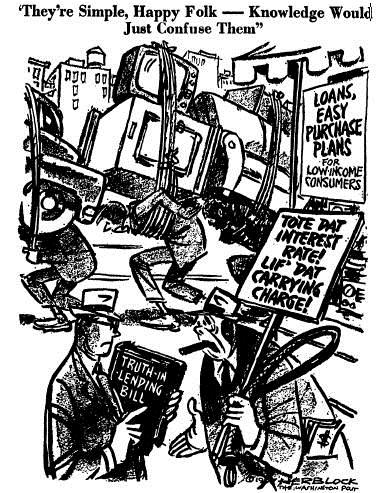Banking and Credit
Since the Great Depression, Congress has passed a series of laws to preserve stability in the banking and credit industries, protect consumers from unfair and deceptive practices and make affordable credit available to middle class and low-income families and small businesses. Beginning in the 1980s, the deregulation of financial institutions has fed speculative booms and devastating busts. Privatization of low-cost government credit for student loans and mortgages and weaker consumer protections has driven up the cost of credit and put consumers at risk.
Commentary
Information is power… and that’s the problem
Why #OccupyWallStreet?
Cry Wolf Quotes
There is no evidence of significant discrimination in mortgage lending.
Legislation likely to result in higher interest rates for consumers is not the answer. [This bill] would broadly constrain the ability of financial institutions to price risk, likely resulting in less access to credit and in higher interest rates for consumers.
[The bill], while well-intentioned, will increase the cost of credit for consumers and small businesses across the country, result in less access to credit for consumers and businesses alike, and may further roil the securities markets -- all at a time when our economy can least afford it.
They say, ‘Well, this is a failure of the markets. Oh, this is about greed on Wall Street.’… the problem here is government intervention in the free markets. 1995, when Bill Clinton decided to tell, you know, [then-Treasury Secretary] Robert Rubin to rewrite the rules that govern the Community Reinvestment Act and push all these institutions to lend to minority communities, many were very risky loans. That was a noble idea, perhaps, but that certainly wasn't following free-market principles. This big pressure on institutions to dole out money and these risky loans started this whole ball rolling at Fannie and Freddie.
Related Laws and Rules
Evidence
-
Banking Lobby's Warnings About CARD Act Disproven
What happened after credit card reform bill passed Congress in 2009 (it worked).
-
The Successes of the CARD Act
The Consumer Financial Protection Bureau describes exactly what the act did and what the effects were one year later.
Backgrounders & Briefs
A Timeline of the CARD Act
An interactive timeline of credit card reform.
Resources
The National Community Reinvestment Coalition works against unfair lending and banking practices, particularly those targeted towards low and middle income families.



